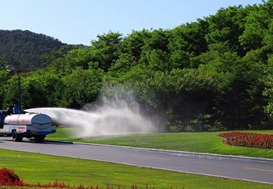Reclaimed Water: Possibilities and Some Problems
by Lori Anne Dolqueist, ENVIRONMENTAL LEADER, April 18, 2010
 Although Americans are used to conserving water during droughts, many still believe that water will always be abundant. In reality, increased population, greater demand, and a stronger emphasis on environmental protection mean that existing water supplies may soon be insufficient (if they are not already). In light of growing concerns regarding water scarcity and drought, water quality issues and global climate change, recycled water is increasingly viewed as a key component in augmenting existing water supplies. Recycled (or reclaimed) water is former wastewater that has been treated to remove solids and impurities. In the United States, it is distributed in light purple pipes to distinguish it from potable water, earning it the moniker “purple water.”
Although Americans are used to conserving water during droughts, many still believe that water will always be abundant. In reality, increased population, greater demand, and a stronger emphasis on environmental protection mean that existing water supplies may soon be insufficient (if they are not already). In light of growing concerns regarding water scarcity and drought, water quality issues and global climate change, recycled water is increasingly viewed as a key component in augmenting existing water supplies. Recycled (or reclaimed) water is former wastewater that has been treated to remove solids and impurities. In the United States, it is distributed in light purple pipes to distinguish it from potable water, earning it the moniker “purple water.”
Recycled water is most often used for landscape irrigation. Nationwide, landscape irrigation accounts for almost one-third of all residential water use – more than seven billion gallons per day. Using recycled water for non-potable uses such as landscaping saves potable water for drinking. Other non-potable uses include cooling water for power plants and oil refineries, industrial processing water for facilities such as paper mills and carpet manufacturers, construction activities, toilet flushing, and dust control. Additionally, some recycled water providers are exploring indirect potable uses of recycled water, such as groundwater recharging. For this use, recycled water is pumped into or percolated down to groundwater aquifers, pumped out, treated again, and finally used as drinking water.
In addition to providing a dependable, drought-resistant water supply, recycled water also offers significant environmental benefits. Once wastewater has been treated to an acceptable level, it becomes an alternative to natural water supplies. By acting as an additional source of water, recycled water enhances water conservation and can decrease the diversion of water from sensitive ecosystems. Other benefits include decreasing wastewater discharges and reducing and preventing pollution. Recycled water can also be used to create or enhance wetlands and riparian habitats.
Barriers to Recycled Water
In many parts of the United States, the uses of recycled water are increasing to accommodate the environmental situation and growing demands for water. However, although the U.S. Environmental Protection Agency regulates potable (tap) water, no federal law governs recycled wastewater for drinking. Some states, such as California, require additional testing for contaminants, but regulation at the state level varies. Given the fractured nature of water regulation, local, state and federal entities are all grappling with the issue of how to regulate and encourage the use of recycled water. Involvement in the process of developing recycled water policies now can mean the difference between success and failure of recycled water projects in the future. Barriers to recycled water projects include:
Public Perception
Despite recycled water being used for decades across the country, there is still a lingering negative public perception. A significant obstacle to increasing the use of recycled water is overcoming the stigma of “toilet-to-tap” water. The phrase “toilet-to-tap” has connotations of uncleanliness, disease, and public health problems – the “yuck factor.” This adds to the lingering misconception that recycled water is a lower quality product. For these reasons, public reaction can be one of the most volatile aspects of promoting water recycling. The public may more readily accept traditional uses of recycled water than projects in which the eventual end use will be a source of drinking water. It is important to obtain public input in the development and implementation of recycled water policies, to both understand the opposition and gain support. [Read rest of article]


